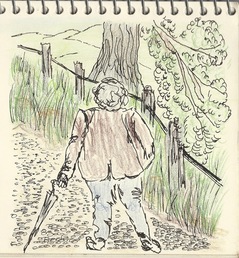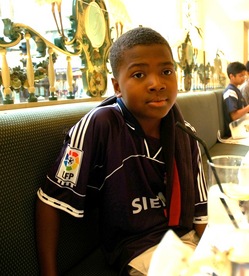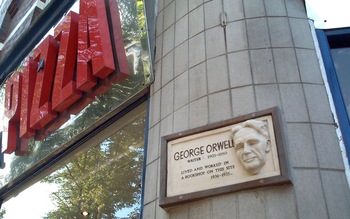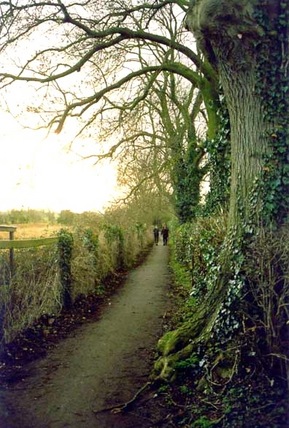
I started walking around London in my mind. It started when I wrote the entry about Jermyn Street. In mentioning Wilton’s I should have mentioned that on my first visit there I ordered roast turkey with fresh peaches. I know, it sound like the Peter Cook and Dudley Moore routine about the Frog & Peach, but nevertheless that’s what I had, with a raspberry syllabub for dessert.
In my mind my walk didn’t stop when Jermyn Street ended at St. James. I imagined walking down St. James and into the park, and around the ponds. And admiring the view of Westminster Abbey from the bridge. And then perhaps out one end of the park toward Victoria or into Pimlico.
Pushing on now, following an instinctive guidance system in my mind, I stop for coffee at that little street (I know just how to find it) with all the cafes and an assortment of street venders. And maybe then veering toward the Tate. The original Tate, you know. And remembering the time I saw the Turner watercolors.
And then in my mind following the Thames all the way around to Hammersmith, and on along the way where houseboats are moored, and to Chiswick House to rest on the lawn, maybe have tea. But stopping first at the churchyard where Hogarth lies buried. And before that at the pub down from Hammersmith bridge with the deck overlooking the water. And of course near that bridge is London’s finest vegetarian restaurant. If you know London you’ll have realized I made a mental U-turn at Chiswick and retraced my steps.

I found many people who liked to walk around London with me, but only one who was always ready to walk, no matter how early in the morning. This was my grandson Emil Evans. “There’s no such thing for me as getting up too early,” he told me. We often walked down into St. James Park and fed the ducks, and made our way over to Westminster. We walked every morning. Our mission was always the same. We were not walking for health or to educate ourselves. We were walking to find the perfect cup of hot chocolate. We found the cheapest cup in London at Chubby’s in Crown Passage, and the most expensive at Fortnum and Mason’s. Both excellent. You always need a serious objective when you’re walking.

On my imaginary walk I could have turned right at the end of Jermyn and walked up St. James to Piccadilly, and down to Park Lane, and up toward Notting Hill, and I could have passed the Mason’s Arms on my way to Pembridge Square and nodded while passing the Hyde Park West Hotel, where I had a tiny room with a window that opened to allow me to stand on a wide roof overlooking London. I could have had lunch at Costa’s, behind the Gate at Notting Hill, the famous movie theater. Or headed on west to Lord Leighton’s House. Or I could have simply walked out the far end of Pembridge Square and stopped for lunch at the Sun in Splendor– the Evening Standard Pub of the Year in 1968. Why do I know that?
I realize this could get boring. It probably already has. I’ll try to get to my point. Sometimes when I write, you understand, it’s like when I walk around London. When I set out I have a general destination in mind, but as I poke around this way and that, I find places I didn’t know about and things that hadn’t occurred to me, maybe glimpse something intriguing at the end of a street, which is how I found Chiswick House, which I had no idea existed.

Daniel Curley, the writer, started me on this London walking in January of 1966. He was the first teacher I had in the first class I took in my freshman year at the University of Illinois, and I ended by taking all of his classes and considering him my mentor. That’s a story in itself. Coming through London after my year in Cape Town, I found his note waiting at American Express. He and his family were spending the year on sabbatical.
Dan was a walker. He had stout waterproof shoes, a slicker, and a knapsack containing a pair of binoculars and a bird guide. That first day he took me for a walk from the Belsize Park tube stop past Keats’ Cottage and onto Hampstead Heath and to the top of Parliament Hill, where all of London was at our feet. And then we set out across the Heath to the tumulus where Boadicea, queen of the land, is said to be buried — unless she’s under the tracks at Kings’ Cross, which is another legend. Curley pointed out the lane of trees where Keats first met Coleridge. We had lunch at the Spaniard’s Inn, where Mr. Pickwick so unwisely proposed marriage.

It was there I first tasted a banger. It would not be my last. Made of fat, cereals and allegedly some meat, the banger is so beloved by the British that they nearly dropped out of the Common Market when Europe disrespected its ingredients. In some pubs they are served with a fork. In others, with a toothpick. They are much improved by Colman’s English Mustard, which every pub supplies in a little pot with a tiny wooden spoon. No other mustard will do. If you insist on Dijon mustard you might as well drop your banger on the floor and grind it under your boot.

On that first day the Spaniard’s was still broken up into cozy little spaces and cul-de-sacs, booths and hideaways. Later vandals came in and “modernized” it, which meant ripping out the age-old walls and “opening it up.” Dan also guided me to to the Blackfriar Pub by the bridge of the same name when it, too, had a public bar, a private bar, a fireplace room, a snug, and so on. Also now denuded. Don’t it always seem to go, that you don’t know what you got, till it’s gone?

Down the way a short distance to Kenwood House, the grandest country house near London. Rembrandts and Romneys, and a trompe l’oeil library. Gardens crowded with giant rhododendron and azaleas, blinding with beauty in the springtime, concealing tunnels you can walk through. Dr. Johnson’s Summer House. It was chilly that first day. On later visits, if the weather was pleasant, I invariably rested on my back under a tree, my eyes shielded by my Tilley Hat, and dozed half-aware of the noises of children and dogs playing.

Then the 210 bus into Highgate and down to the cemetery and to the graves of Karl Marx and George Eliot, and then across the way to Old Highgate Cemetery — because, this being London, Marx and Eliot were in the new part, you see. In those days the Friends of Highgate Cemetery hadn’t yet started clearing the tangled growth that choked the cemetery during the war, when all the groundsmen were needed as air raid wardens. Tombstones leaned at crazy angles, some graves gaped open, and the Columbarium looked like a set for Hammer horror films — which, indeed, it often was. A daughter of Charles Dickens rests there, and Radclyffe Hall, with a plaque signed by her lover Una. The cemeetry is overshadowed by the looming back wall of St. Michael’s Church, where Coleridge is buried under the center aisle.

But there I go again. The thing is, Dan Curley started me on the walk of a lifetime. A walk around London, which you will never exhaust. We walked along the canals of Little Venice into the Zoo, and then down through Regent’s Park. We walked the South Bank when abandoned warehouses still scented the air with the spices of the East. Clink Street. Southwark Cathedral. We went into the old Cockney streets of the East End, now home for East Asians, and into Tower Hamlets Cemetery. We prowled on another cold winter morning the Chapter House of Westminster Abbey, so much older than the church.
We stopped from time to time in pubs, where a pint of bitter would make a stop at another pub inevitable. It was then that I acquired a lifelong meme which I will now pass along to you. As Dan stood before a urinal, he would invariably intone, “As the man says in the play, for this relief, much thanks. Since January 1966 I have rarely urinated without repeating that phrase. It works wonders. Now it’s yours. Years and years from now, a tiny bit of Dan Curley and me will live on as you quote your Shakespeare.

One thing Dan suggested was getting a cheap pass on London Transport, picking a tube stop at random, coming up and poking around. It was he who told me the Henry James line about a top seat in he front on a London omnibus, which I have tired you with time and again. We went to St. Paul’s and the Wren Churches of the City. We walked past the gaping doorways of the roaring presses when Fleet Street still churned out newspapers. We walked Kings’ Road to the World’s End and beyond. We walked and walked, and I have been walking ever since.
We only walked London together once again, when we joined Jack Lane the photographer in writing on The Perfect London Walk, describing that first walk over the Heath. But his influence was lifelong. Because of him, I daresay I know London better than he did. In every city, I would walk the same way. In Venice I would set out deliberately to get lost. Don’t get me started on Paris, Toronto, Edinburgh or Stockholm — where I didn’t know there was an Old Town until I found it.

Some time ago I heard about the 10,000 Steps a Day Program. I bought a pedometer, and tried to use it 365 days a year. That lasted five years, until my first big surgery. I found streets in Chicago I didn’t know existed. I did the lakefront in both directions, and the River Walk, on both banks, and the Loop, and the streets and shops of New Town, Rogers Park and Devon Avenue, where you could be in Mumbai or Karachi, and Chinatown, and Greek Town.
I was not a fast walker, but I was steady. Walk too fast and you miss the show. I doodled. Dawdled. Moseyed. Sat down and thought. Gazed into space. Carried along a book. Sketched this and that. An iPod would have been an atrocity. When I was dive-bombed by angry cardinals protecting their nests in Lincoln Park, I wanted to hear their fury. By the ponds in spring I would marvel at small orange fish so thick in the water a duck could have walked on them — bright fish you’d see in the shallows for two weeks, and never again. They made a soft splashes like a squishy washing machine.
After the first surgery, my leg muscles wouldn’t support me. I had to be winched from the bed and lowered into a wheelchair. I went through four rehabs in all. Each time I began again with a few steps using a walker. One day I walked all the way around the nurse’s station. When “Avatar” shows humans reclining indefinitely while occupying their surrogate bodies, I know that after a month they won’t be able to take a step on their own. There should be a sequel named “Avatar Rehab.”

I was able to walk again after each rehab. I’m doing fine now. I walk around the neighborhood and in the park, and at Cannes and Toronto I power down the street to make those screenings. It is important that I repeat certain rituals. Tucked in just north of the Lincoln Park Zoo, in a secret pocket of the city not everyone knows about, you will find the Alfred Caldwell Lily Pond. It’s surrounded by thick shrubbery. I’ve seen a lot of rabbits there, and once maybe a fox. Birders prowl it. I walk around it and affirm my continuing existence.
Here’s the curious thing. These memories are happening all the time now. I retrace those steps in my mind, and I remember details for the first time. I’m coming to believe that everything is stored away in my mind somewhere — every step I took, every street I walked, every window I looked at and wondered, who lives there? At the east end of Pembridge Square there was a high window with a wooden silhouette of a palm tree in it. Whose was it?
I believe that I could pause right now and remember something I saw on a walk that I have never thought of again since that time. I’ll play fair with you. I’m pausing. I’m going to go quote Shakespeare.

I’m back. Much thanks. After you leave the Belsize Park tube stop you angle down through an old churchyard on your way to Keats’ Cottage. On the corner you will see a pizza parlor. I sign marks it as the location of the book shop where George Orwell once worked, the one that inspired his novel Keep the Aspisdistra Flying. That’s not what I remembered. Some steps up the hill to your left you will find the Roebuck Pub, and a Blue Plaque marking the dwelling of one of the Huxleys, perhaps Thomas, “Darwins bulldog.” Those aren’t what I remembered, either. A door or two away, there is, or used to be, a nursery school, and displayed in its windows one day were colorful zoo animals, cut out of construction paper. That was thirty-five years ago, at least, and I remembered it again this moment.
These fragments I have shored against my ruins. Have you laid in your own supply? Someone asked me what I would do if I had one day in London. I thought about that. I decided that one single day in London would be to frustrating to even think about. I would get out of town.

I would go to Liverpool Street Station early in the morning, and take a train to Cambridge. From the station I would ask a taxi to take me to the beginning of the foot-path to Grantchester. A taxi, because I don’t know the way by foot and I want to be on the meadows as soon as possible. Once on the footpath, there is no getting lost. There is a series of pastures, the Cam flowing at their feet. You let yourself through turnstiles that guard the cattle. It is so quiet. The wind in the trees. At the end of the path, after half an hour or so, you’re passing the back gardens of Grantchester Village.

You walk straight on to a small road, cross it and go into the churchyard. The Old Vicarage is to your right. Some of you know where this is leading. Beside the path to the church is the little War Memorial, and among the names is Rupert Brooke’s. He isn’t buried there. Some small patch of foreign soil will be forever England. You look to the church tower to tell the time.
Oh, is the water sweet and cool, Gentle and brown, above the pool? And laughs the immortal river still Under the mill, under the mill? Say, is there Beauty yet to find? And Certainty? and Quiet kind? Deep meadows yet, for to forget The lies, and truths, and pain?… oh! yet Stands the Church clock at ten to three? And is there honey still for tea?
For decades the clock was stopped, and undergraduates could point to it and prove it was not yet three — pub closing time. Fools took up a subscription and repaired the clock, which now keeps perfect time. But the water is sweet and cool below the deep meadows.
“The Perfect London Walk,” a miraculous video by Karl-Heinz. My heart leapt up when I beheld it. Step after step, street, path and lane, from the tube station to Parliament Hill.
“The Perfect London Walk,” Part Two. I recognize individual trees, especially that giant felled by the high winds in the 1980s. I’ve rested on that very bench overlooking the secret meadow. Karl-Heinz, we now take this walk together.
“The Old Vicarage, Grantchester,” by Rupert Brooke. Read by Tom O’Bedlam. Click here.

<a href=”http://ws.amazon.com/widgets/q?ServiceVersion=20070822&MarketPlace=US&ID=V20070822%2FUS%2Frogerebcom-20%2F8001%2F927e0e6a-d4cc-4a2a-beb2-04c86e4e4a89&Operation=NoScript”>Amazon.com Widgets</a>











